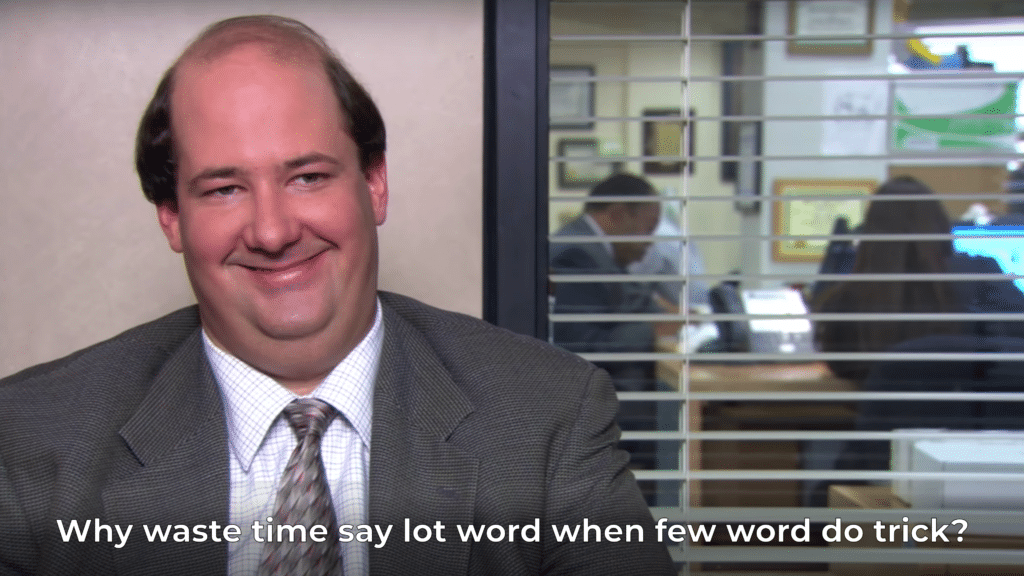Word count is a hotly debated topic amount top SEO’s. If you’ve worked with us on an SEO campaign, you’d probably have heard us talk about how important content is.
If you’ve landed on a search-optimised landing page or blog post, you’ve probably wondered why someone felt like they needed to write 5,000 words on digital marketing.
Well, SEO and a lot of content go hand-in-hand. We all know Google loves content, but how much do they actually want? How much content is too much? Is it actually quality over quantity or is it… a little bit the opposite?
The factors that go into your ranking position
Referring Domains & Backlinks
A backlink is where someone has linked to your website or piece of content. If they link to two separate pages, you’ll receive two backlinks. However no matter how many different backlinks you receive from a website, it’ll be one referring domain.
A backlink to your content tells Google that someone has cited you, meaning the content is good. The better the website that links to you, the better the link, and thus, the better Google deems your content.
Organic Keywords
Organic keywords are searched terms that you’re ranking for and you’re gaining website traffic from organically. Organic basically means naturally or for free, as opposed to paid search, like Google Ads.
Domain Rating/Domain Authority /Authority Score
What we call this will depend on your SEO software:
- Ahrefs: Domain Rating
- SEMrush: Authority Score
- Moz: Domain Authority
Each program uses a different algorithm to calculate these scores but they all paint a suuuper similar picture.
Ahrefs’ Domain Rating (DR) is based on the strength of the site’s backlink profile.
Moz’s DA is based on the domain age, the backlink profile, and a few other factors.
SEMrush’s Authority Score is based on the overall quality of the site, its links, search data, keyword positions, and website traffic.
These all basically tell us a bit about how authoritative the website is and how likely it is to rank.
Organic Traffic
Like organic keywords, organic traffic is the kind you’ve earned for “free”. It means the website visitors have come from you showing up on Google organically, as opposed to Google Ads.
Ranking organically is the #1 way to snatch up that organic traffic, but traffic plays into your organic rankings.
These factors all feed off of each other
While we all follow all the Google algo updates, there’s no real, perfect science to appeasing the algorithm and the Google gods.
It used to be a case of stuff as many keywords as you can into one page and you’d rank in the top 10. Not so much anymore.
There’s a many factors that each get weighed while Google’s indexing your website.
There’s how many referring domains you have, your keyword density, and the traffic to the page.
But there’s no hard and fast rules like 10 referring domains and 2.4 per cent keyword density will land you a first page position.
Firstly, that’d be chaotic as all hell, but secondly, the parameters would continue to change, because if each website ticked those three specific boxes, then who would win?
via GIPHY
As an example a brand new website with no backlinks or referring domains and no authority in the eyes of Google could write a 10,000 word landing page. It could be perfectly cited, linking to hugely authoritative websites to back up their claims. The content could be perfect.
There’s still a really solid chance that a website like HubSpot or Apple would beat it with 100 words of content.
The ranking factors all work together to build a super duper well optimised page.
Content and its quantity’s role in ranking
Okay so, we know for sure that content and the quantity of it plays a role in ranking. From the SEO plugins that yell at you to write at least 300 words on WordPress to every SEO ever going on and on about it.
“But where’s the evidence?!”
Well, we wouldn’t be the first to question the content length debacle. In fact, tonnes of studies have been completed on this…
Ahrefs did one back in 2018, concluding that, “Longer content will get you better rankings in the SERPs. This has been proven by multiple studies over several years.”
After analysing rankings across two million keywords, they determined a big ol’ correlation between content length and the position it ranks in.
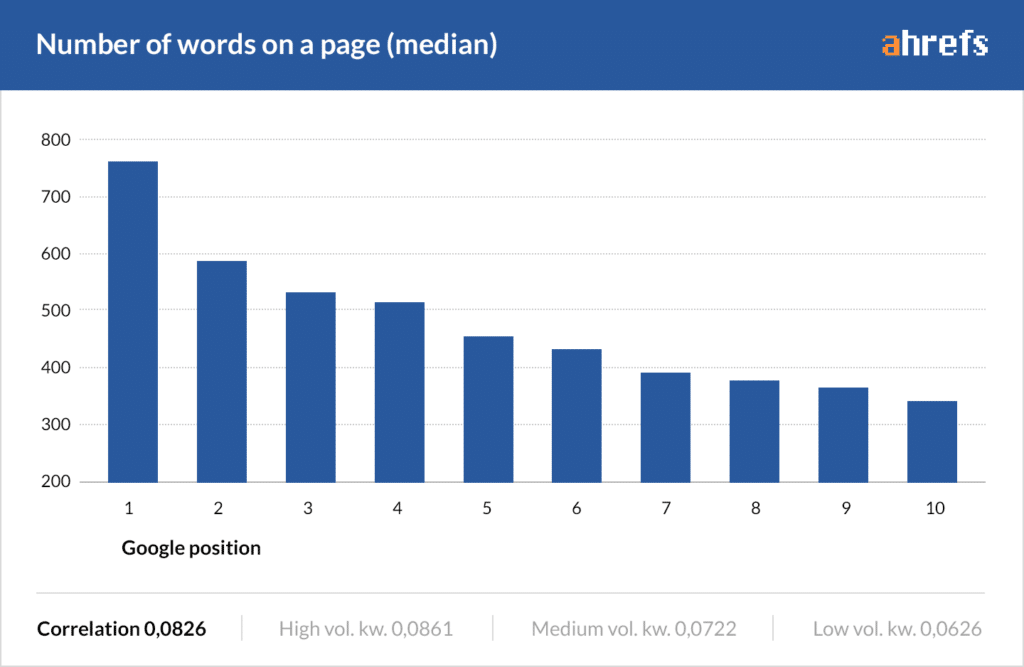
Though, there’s another theory that longer content attracts more links, and that’s why longer content pieces rank better… on account of the links.
HubSpot’s 2015 investigation found that articles with a word count somewhere between 2,250 and 2,500 words earn the most organic traffic. Articles with a word count over 2,500 get shared the most on social media. And, most importantly, articles with a word count over 2,500 earn the most links.
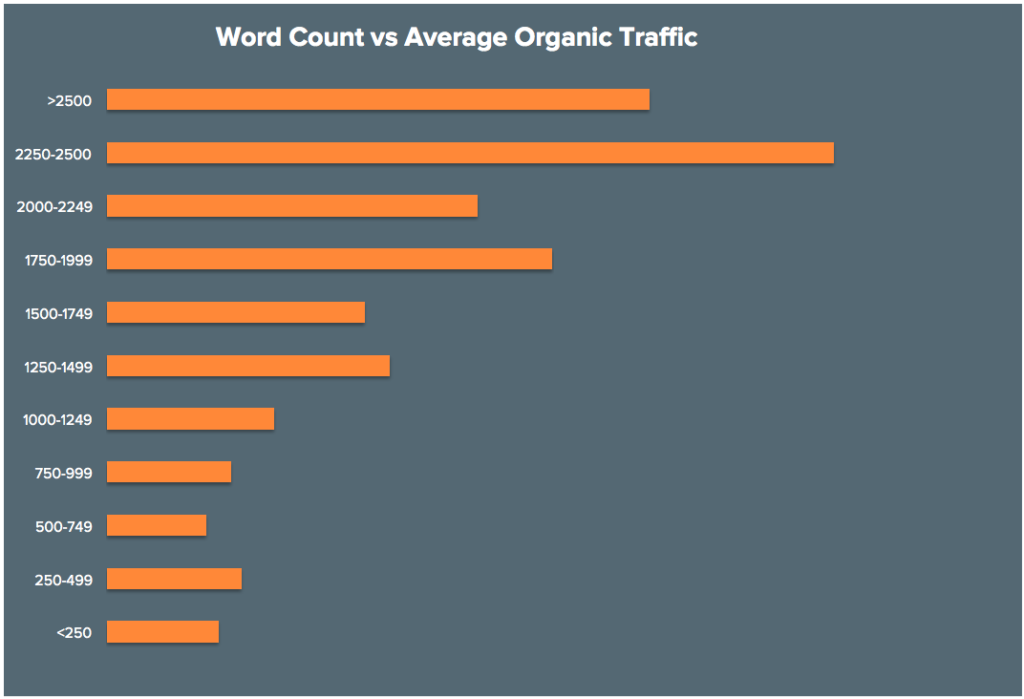
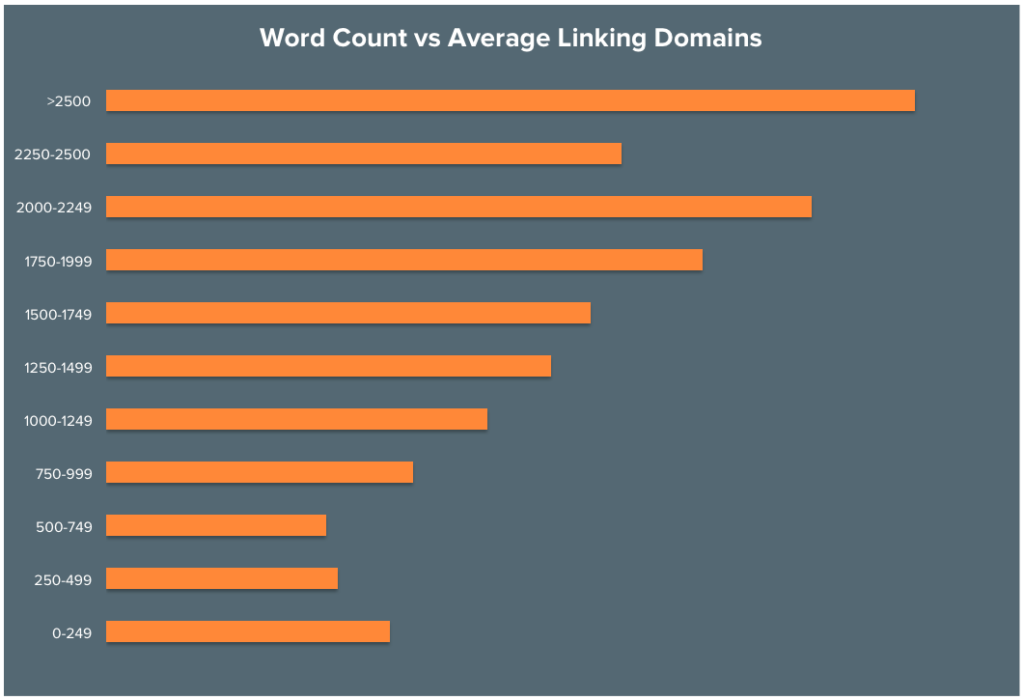
Google says nah, it’s quality over quantity
Google has stood by this for a while. The general idea is that Google wants quality content. They want content that answers Google users’ questions thoroughly and contributes to the education and enlightening of its users.
To give a really thorough rundown and provide a thorough overview of a subject, we can say with pretty solid confidence that 300 words won’t suffice.
A 1,500 to 2,500 word blog post has a good chance of answering all of your questions though.
“Some pages have a lot of words that say nothing,” says Google’s John Mueller.
We really like Ahrefs’ advice on this, “Don’t shoot for a particular word count — just make sure you cover a topic in full.
“Whether that takes 500 words or 10,000, the key is that you are creating the best resource available for your target keyword.”
Then why are we all so obsessed with content length then?
Well, yeah John Mueller himself said your word count is meaningless to Google. And from an algorithm standpoint — that’s correct.
Buuuut, your content’s length affects your other ranking factors, like your backlinks as proven by HubSpot.
Longer content also has a bigger chance of answering the Google searcher’s query, which is also a ranking factor.
Finding the balance between quality and quantity
Okay, so we can summarise that word count definitely does matter — just not how we all think it does.
We need to write content that’s long enough to cover the topic in full, we need to answer each question that goes along with it, and we need to use plenty of evidence along the way.
So, basically create comprehensive, valuable content. In saying that though, I think we can determine that while Google’s algorithm is currently indexing longer landing pages higher, it doesn’t seem like that’s the search engine’s end goal.
It seems like as Google and its algorithms progress, we’ll see the better quality landing pages take over and those god forsaken 8,000 word landing pages sink to the bottom. Maybe?
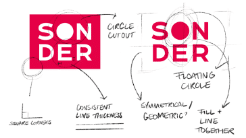

 Don’t delay book a free digital chat today
Don’t delay book a free digital chat today